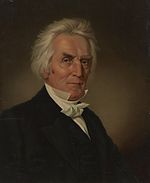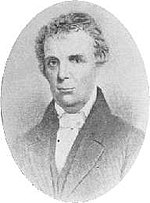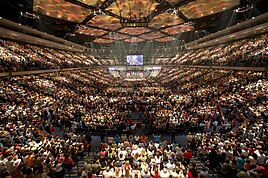Nondenominational Christianity
Nondenominational Christianity (or non-denominational Christianity) consists of churches, and individual Christians, which typically distance themselves from the confessionalism or creedalism of other Christian communities by not formally aligning with a specific Christian denomination.
The examples and perspective in this seems to deal with the US only may not represent a worldwide view of the subject. (September 2023) |
According to Arizona Christian University's Cultural Research Center, nondenominational faith leaders typically maintain a biblical worldview at higher percentages than those of other Christian groups.
In North America, nondenominational Christianity arose in the 18th century through the Restoration Movement, with followers organizing themselves simply as "Christians" and "Disciples of Christ". The nondenominational movement saw expansion during the 20th century Jesus movement era, which popularized contemporary Christian music and Christian media within global pop culture.
Nondenominational churches adhere to congregationalist polity, every local church is independent, take for example cowboy churches. Often congregating in loose associations such as the Churches of Christ, or in other cases founded by individual pastors such as Chuck Smith's Calvary Chapel Association, few are affiliated with historic denominations, but many adhere to a form of evangelical Christianity. Though some non-denominational churches have elder-ruled non-denominational churches have grown quite recently within networks like Acts 29.
History

Nondenominational Christianity first arose in the 18th century through the Stone-Campbell Restoration Movement, with followers organizing themselves simply as "Christians" and "Disciples of Christ". Congregations in this tradition of nondenominational Christianity often refer to themselves as Churches of Christ.
Independent nondenominational churches continued to appear in the United States in the course of the 20th century.
Nondenominational congregations experienced significant and continuous growth in the 21st century, particularly in the United States. If combined into a single group, nondenominational churches collectively represented the third-largest Christian grouping in the United States in 2010, after the Roman Catholic Church and Southern Baptist Convention.
In Asia, especially in Singapore and Malaysia, these churches are also more numerous, since the 1990s.
Characteristics
Nondenominational churches are by definition not affiliated with any specific denominational stream of Christianity, whether by choice from their foundation or because they separated from their denomination of origin at some point in their history. Like denominational congregations, nondenominational congregations vary in size, worship, and other characteristics. Although independent, many nondenominational congregations choose to affiliate with a broader network of congregations.
Many nondenominational churches can nevertheless be positioned in existing movements, such as Evangelicalism and Pentecostalism, even though they are autonomous and have no formal labels.
Nondenominational churches are particularly visible in the megachurches.
The neo-charismatic churches often use the term nondenominational to define themselves.
Some non-denominational churches identify solely with Christianity.
Criticism
Boston University religion scholar Stephen Prothero argues that nondenominationalism hides the fundamental theological and spiritual issues that initially drove the division of Christianity into denominations behind a veneer of "Christian unity". He argues that nondenominationalism encourages a descent of Christianity—and indeed, all religions—into comfortable "general moralism" rather than being a focus for facing the complexities of churchgoers' culture and spirituality. Prothero further argues that it also encourages ignorance of the Scriptures, lowering the overall religious literacy while increasing the potential for inter-religious misunderstandings and conflict.
Steven R. Harmon, a Baptist theologian who supports ecumenism, argues that "there's really no such thing" as a nondenominational church, because "as soon as a supposedly non-denominational church has made decisions about what happens in worship, whom and how they will baptize, how and with what understanding they will celebrate holy communion, what they will teach, who their ministers will be and how they will be ordered, or how they relate to those churches, these decisions have placed the church within the stream of a specific type of denominational tradition". Harmon argues that the cause of Christian unity is best served through denominational traditions, since each "has historical connections to the church's catholicity ... and we make progress toward unity when the denominations share their distinctive patterns of catholicity with one another".
Presbyterian dogmatic theologian Amy Plantinga Pauw writes that Protestant nondenominational congregations "often seem to lack any acknowledgement of their debts and ties to larger church traditions" and argues that "for now, these non-denominational churches are living off the theological capital of more established Christian communities, including those of denominational Protestantism". Pauw considers denominationalism to be a "unifying and conserving force in Christianity, nurturing and carrying forward distinctive theological traditions" (such as Wesleyanism being supported by Methodist denominations).
In 2011, American evangelical professor Ed Stetzer attributed to individualism the reason for the increase in the number of evangelical churches claiming to be nondenominational Christianity.
See also
Notes
References
External links
This article uses material from the Wikipedia English article Nondenominational Christianity, which is released under the Creative Commons Attribution-ShareAlike 3.0 license ("CC BY-SA 3.0"); additional terms may apply (view authors). Content is available under CC BY-SA 4.0 unless otherwise noted. Images, videos and audio are available under their respective licenses.
®Wikipedia is a registered trademark of the Wiki Foundation, Inc. Wiki English (DUHOCTRUNGQUOC.VN) is an independent company and has no affiliation with Wiki Foundation.






